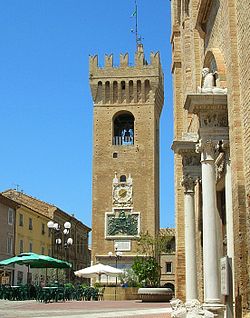Recanati
| Recanati | ||
|---|---|---|
| Comune | ||
| Città di Recanati | ||

Civic Tower.
|
||
|
||
| Location of Recanati in Italy | ||
| Coordinates: 43°24′N 13°33′E / 43.400°N 13.550°E | ||
| Country | Italy | |
| Region | Marche | |
| Province / Metropolitan city | Macerata (MC) | |
| Frazioni | Bagnolo, Castelnuovo, Chiarino, Le Grazie, Montefiore, Santa Lucia | |
| Government | ||
| • Mayor | Francesco Fiordomo (Democratic Party) | |
| Area | ||
| • Total | 102 km2 (39 sq mi) | |
| Elevation | 296 m (971 ft) | |
| Population (31 December 2010) | ||
| • Total | 21,830 | |
| • Density | 210/km2 (550/sq mi) | |
| Demonym(s) | Recanatesi | |
| Time zone | CET (UTC+1) | |
| • Summer (DST) | CEST (UTC+2) | |
| Postal code | 62019 | |
| Dialing code | 071 | |
| Patron saint | St. Vitus | |
| Saint day | June 15 | |
| Website | Official website | |
Recanati (Italian pronunciation: [rekaˈnaːti]) is a town and comune in the Province of Macerata, in the Marche region of Italy. Recanati was founded around 1150 AD from three pre-existing castles. In 1290 it proclaimed itself an independent republic and, in the 15th century, was famous for its international fair. In March 1798 it was conquered by Napoleon Bonaparte.
It is the hometown of tenor Beniamino Gigli and poet Giacomo Leopardi, which is why the town is known to some as "the city of poetry". It contains the Teatro Persiani named after the composer of operas in the first part of the 19th century, Giuseppe Persiani, who was born in the town in 1799.
The origin of Recanati are unclear, although the area was inhabited since prehistoric times by the Piceni. In Roman times, the river Potenza, which was navigable then, saw the rise of two cities: Potentia, at the mouth, and Helvia Recina, located more inland. When the Goths led by Radagaisus ravaged the region around 406 AD, their inhabitants took refuge on the hills, perhaps founding the modern Recanati, which would take its name from Ricina.
In the 12th century, during the controversies between Frederick Barbarossa and the Papacy, Recanati expelled the feudal counts which ruled its area, and gave itself a communal constitution under the lead of consuls (consoli). In 1203 they were replaced by podestà. In 1228, when Barbarossa's nephew Frederick II was also in conflict with the popes, Recanati sided for him, and was thus given the whole control of the seaside, and the right to found a port (the modern Porto Recanati). In 1239, however, Recanati supported the pope, and the following year Gregory IX gave it the title of City and bishopric seat that had been previously held by the nearby Osimo.
...
Wikipedia


